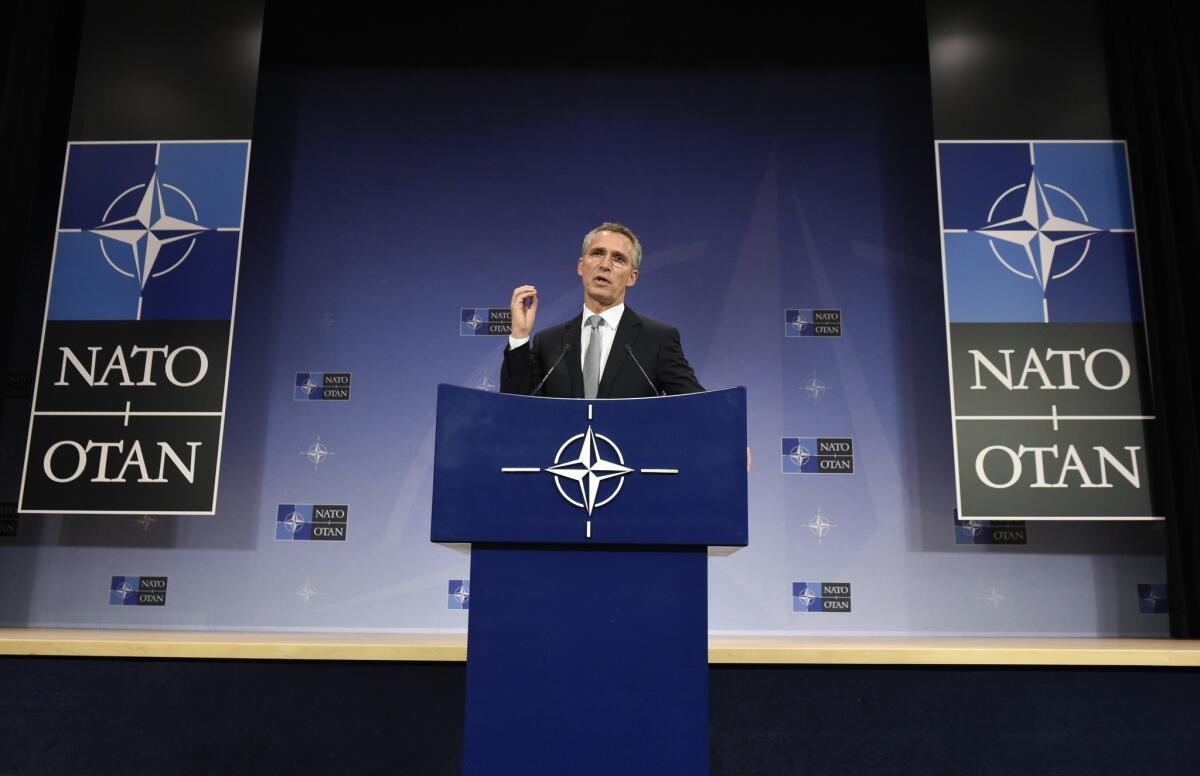NATO chief vows to defend Turkey against Russian threats

NATO Secretary-General Jens Stoltenberg speaks at a joint news conference during a defense minister meeting at NATO headquarters in Brussels.
Reporting from Brussels — Amid heightened regional tensions following Russia’s armed intervention in Syria, the head of NATO vowed Thursday to help defend Turkey, if necessary, against Russian threats.
The two countries have come close to clashing in recent days in the escalating regional crisis, and Ankara called in the Russian ambassador to complain after a series of worrying incidents.
The widening Syrian conflict was high on the agenda Thursday as Secretary of Defense Ashton Carter and other NATO defense ministers gathered for a daylong meeting focused on international crises.
At a news conference, Carter said Russia was engaging in “erratic and self-defeating behavior” by rebuffing the U.S.-led coalition against Islamic State and by unilaterally conducting airstrikes in Syria.
Moscow is “in a shroud of isolation,” he said.
Ankara scrambled fighter jets Monday after Russian warplanes twice crossed into Turkish airspace from Syria.
Moscow blamed the brief cross-border intrusions on bad weather and navigational errors, but NATO officials viewed them as deliberately provocative.
The Turkish military said Wednesday that a ground-based anti-aircraft system inside Syria also “harassed” eight Turkish F-16 fighter jets as they patrolled Turkey’s southern border.
The missile system “locked-on” the jets with radar, alerting the pilots that they were being tracked. A MiG-29 fighter jet inside Syria separately locked on a Turkish jet with air-to-air missiles.
The Pentagon has instructed U.S. pilots flying bombing missions in Syria to stay at least 20 miles from Russian aircraft to avoid the chance of midair collisions or other problems.
Jens Stoltenberg, secretary general of the North Atlantic Treaty Organization, told reporters here Thursday that the alliance “is ready and able to defend all allies, including Turkey, against any threats.”
“All of this sends a clear message to all NATO citizens: NATO will defend you. NATO is on the ground,” he said. “NATO is ready.”
Turkey is one of the 28 member nations in the NATO alliance.
NATO maintains six Patriot missile batteries on Turkey’s southern border that are supposed to intercept any incoming missiles from Syria. The United States, the Netherlands and Germany provided the systems.
The Pentagon said earlier this year it intends to withdraw its missile battery for maintenance and upgrades, but Turkey is seeking a delay and Stoltenberg indicated the decision is being reevaluated.
“We are discussing with different allies how to augment and move forth and continue,” he said.
Russian warplanes continued to pummel rebel targets in western Syria to support a day-old ground offensive led by forces loyal to President Bashar Assad, according to the British-based Syrian Observatory for Human Rights.
A day after four Russian warships in the Caspian Sea fired 26 cruise missiles into Syria, the air, sea and land offensive appeared aimed at clawing territory back from rebel groups that have sought to oust Assad since the war began in 2011.
Russia maintains its only foreign naval base in the Syrian port of Tartus. It now has 10 warships offshore in the eastern Mediterranean.
Russia has disputed NATO’s assessment that its airstrikes are hitting an array of anti-government militias, including some armed by the CIA. Moscow insists it is targeting Islamic State and Al Nusra Front, an Al Qaeda affiliate.
“I call on Russia to play a constructive role in the fight” against Islamic State, Stoltenberg told reporters. “But Russian actions and the support to the [Assad] regime are not helpful.”
Kremlin spokesman Dmitry Peskov said the Russian strikes are intended to safeguard Syria and ensure “stability and security in the region,” according to Today’s Zaman, an English-language newspaper in Turkey.
Follow @wjhenn for military and defense info.
More to Read
Sign up for Essential California
The most important California stories and recommendations in your inbox every morning.
You may occasionally receive promotional content from the Los Angeles Times.











